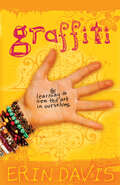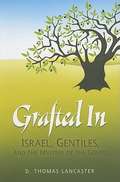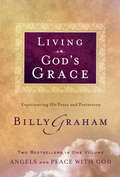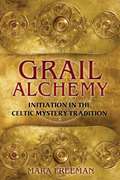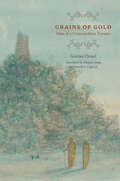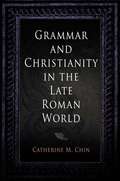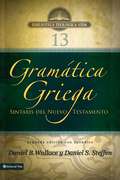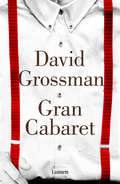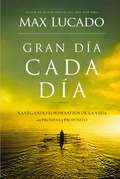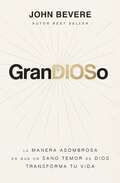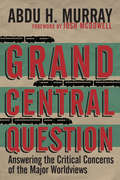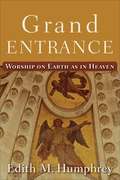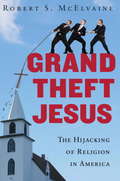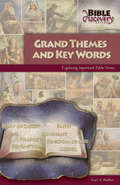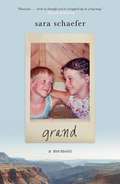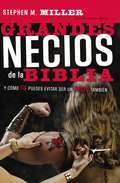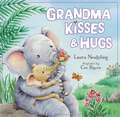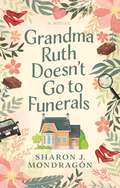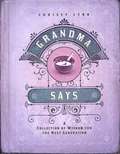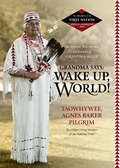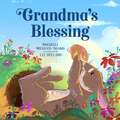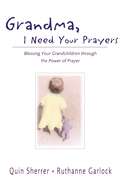- Table View
- List View
Graffiti: Learning to See the Art in Ourselves
by Erin DavisOur culture is driven by a concept of beauty that negatively impacts adolescent girls. The Scriptures are full of assurances regarding our identity in Christ, inherent worth to the Creator, and the secrets to tapping into the source of true and lasting beauty, yet girls and young women continue to struggle with their focus on outer beauty. In Graffiti: Learning to See the Art in Ourselves, Erin Davis applies the language of God's Word on identity, beauty, and worth to the life of a contemporary young woman. In fact, women who have never adequately dealt with this issue will find themselves reviewing their youth, and redirecting their spiritual eyes.
Grafted In: Israel, Gentiles, and the Mystery of the Gospel
by D. Thomas LancasterBack Cover: "The Apostle Paul compared Gentile Christians to olive branches cut from wild, olive trees and grafted into the olive tree of Israel. He believed that the dividing wall separating Jew and Gentile had been removed, and to him this was the "mystery of the Gospel." From where does Paul derive his conclusions, and what does being "grafted in" mean? Grafted In is a book for Christians exploring their Hebrew Roots, for Gentiles in Messianic Judaism, and for Jewish believers seeking answers about Paul.... Originally published under the title The Mystery of the Gospel, this completely revised and updated edition contains a new introduction by the author and two new appendices: Originally published under the title The Mystery of the Gospel, this completely revised and updated edition contains a new introduction by the author and two new appendices: 'We Were in a Synagogue' and 'To Pray as a Gentile.' 'We Were in a Synagogue' and 'To Pray as a Gentile.'"
Graham 2in1 (Angels/Peace With God): Angels And Peace With God
by Billy GrahamA special bundle of two books authored by Billy Graham. "Angels" and "Peace With God".
Grail Alchemy: Initiation in the Celtic Mystery Tradition
by Mara FreemanAn experiential guide to the spiritual path of the Holy Grail • Traces the evolution of the Holy Grail from the sacred vessel of the Celtic goddess to the Cup of Christ and how it represents the longing for the divine feminine • Provides exercises, meditations, and rituals to connect you with the powers of the Cauldron of Rebirth, the Chalice of Healing, the Sword of Light, and the Holy Grail • Explains how attaining the Grail brings full consciousness of the soul and Divine influence for the healing of self and others The primary myth of Western culture, the quest for the Holy Grail persists through the centuries like a recurring dream, embodying the longing for the divine feminine suppressed for more than two thousand years. The Holy Grail emerged not only as a symbol of the feminine but also as a symbol of the soul, for hidden within the sacred Grail legends lies an initiatory path that leads to the highest realms of consciousness and spiritual illumination. By working with the symbols of the Grail tradition we can gaze into our own hidden depths and heal the separation between masculine and feminine, Spirit and Matter, and Heaven and Earth. Mara Freeman traces the evolution of the Grail from the sacred vessel of the Celtic goddess to the Cup of Christ, revealing a spiritual path rooted in the mysteries of the Goddess, the Grail, and the Sword. She explains how the Sword has dominated over the Goddess and the Grail for far too long, leading to a spiritual wasteland as foretold in the Grail stories. She provides a practical workbook of exercises, visualizations, and magical rituals to restore the power of the divine feminine through spiritually transformative experiences with the Cauldron of Rebirth, the Chalice of Healing, the Sword of Light, and the Holy Grail itself. Drawing on folk traditions and medieval Arthurian romances as well as alchemy and the wisdom of the mystics of Glastonbury, Freeman reveals the ancient Celtic teachings of the Western Mystery tradition. She shows that attaining the Grail involves achieving full consciousness of the soul. Then, as a Grail-bearer, you can bring the light of the Grail into the world for the healing of self and others.
Grains of Gold: Tales of a Cosmopolitan Traveler (Buddhism and Modernity)
by Gendun Chopel“Translated with grace and precision . . . gives us a rare glimpse of how Asian religion and life appeared from the perspective of the Tibetan plateau.” —Janet Gyatso, Harvard UniversityIn 1941, philosopher and poet Gendun Chopel sent a manuscript by ship, train, and yak across mountains and deserts to his homeland in Tibet. He would follow it five years later, returning to his native land after twelve years in India and Sri Lanka. But he did not receive the welcome he imagined: he was arrested by the government of the regent of the young Dalai Lama on trumped-up charges of treason. He emerged from prison three years later a broken man and died soon after. Gendun Chopel was a prolific writer, yet he considered that manuscript, to be his life’s work, one to delight his compatriots with tales of an ancient Indian and Tibetan past, Now available for the first time in English, Grains of Gold is a unique compendium of South Asian and Tibetan culture that combines travelogue, drawings, history, and ethnography. Chopel describes the world he discovered in South Asia, from the ruins of the sacred sites of Buddhism to the Sanskrit classics he learned to read in the original. He is also sharply, often humorously critical of the Tibetan love of the fantastic, bursting one myth after another and finding fault with the accounts of earlier Tibetan pilgrims. The work of an extraordinary scholar, Grains of Gold is a compelling work animated by a sense of discovery of both a distant past and a strange present.“The magnum opus of arguably the single most brilliant Tibetan scholar of the twentieth century.” —Lauran Hartley, Columbia University
Grammar and Christianity in the Late Roman World
by Catherine M. ChinBetween the years 350 and 500 a large body of Latin artes grammaticae emerged, educational texts outlining the study of Latin grammar and attempting a systematic discussion of correct Latin usage. These texts--the most complete of which are attributed to Donatus, Charisius, Servius, Diomedes, Pompeius, and Priscian--have long been studied as documents in the history of linguistic theory and literary scholarship. In Grammar and Christianity in the Late Roman World, Catherine Chin instead finds within them an opportunity to probe the connections between religious ideology and literary culture in the later Roman Empire.To Chin, the production and use of these texts played a decisive role both in the construction of a pre-Christian classical culture and in the construction of Christianity as a religious entity bound to a religious text. In exploring themes of utopian writing, pedagogical violence, and the narration of the self, the book describes the multiple ways literary education contributed to the idea that the Roman Empire and its inhabitants were capable of converting from one culture to another, from classical to Christian. The study thus reexamines the tensions between these two idealized cultures in antiquity by suggesting that, on a literary level, they were produced simultaneously through reading and writing techniques that were common across the empire.In bringing together and reevaluating fundamental topics from the fields of religious studies, classics, education, and literary criticism, Grammar and Christianity in the Late Roman World offers readers from these disciplines the opportunity to reconsider the basic conditions under which religions and cultures interact.
Grammar and Composition III Quizzes and Tests
by Pensacola Christian CollegeGrammar & Composition III QUIZZES/TESTS for Grades 9 and 10
Grammar and Composition Work-Text III (5th edition)
by James A. ChapmanWorkbook for Grammar and Composition textbook, for Christian schools.
Gramática griega: Sintaxis del Nuevo Testamento - Segunda edición con apéndice (Biblioteca Teologica Vida)
by Daniel B. Wallace Daniel S. SteffenMuchos estudiantes de griego se frustran porque nunca aprenden cómo aplicar su conocimiento básico del griego a una interpretación del texto. Este libro ofrece un texto de referencia para los cursos de gramática griega del segundo año, y servirá de vínculo entere las formas de las palabras y sus diferentes usos dentro de contextos distintos. Estas diferencias casi siempre cambian el significado de la traducción e interpretación del teto griego del Nuevo Testamento.Este libro tan práctico:• Ayuda a conocer los contextos en que hay diferentes usos de las formas griegas.• Incluye muchos ejemplos del texto griego del Nuevo Testamento que sirve de modelo de cómo hacer exégesis.• Incluye ejercicios que permiten al estudiante aplicar la lista de usos de las categorías de sintaxis, después de aprenderlos.Este libro de sintaxis de la gramática griega es una adaptación y abreviatura del libro Greek Grammar Beyond the Basics: An Exegetical Syntax of the New Testament, que se usa en multitud de cursos de exégesis en muchos seminarios en inglés y otros idiomas del mundo. Este libro, por fin, cubre una necesidad en la enseñanza de la exégesis gramatical para todo el mundo que habla español.
Gran Cabaret
by David GrossmanNOVELA GANADORA DEL PRESTIGIOSO MAN BOOKER INTERNATIONAL PRIZE 2017. Ana María Bejarano obtuvo en 2016 el Premio Nacional a la Mejor Traducción 2016 por la traducción de Gran Cabaret del hebreo al castellano. David Grossman construye una novela feroz y tierna a la vez, una pieza espléndida en la que un hombre de mediana edad subido a un miserable escenario es capaz de convertir un antro en un Gran Cabaret: el cabaret de la vida. Estamos en Cesarea, una localidad costera de Israel, y un hombre sube al escenario de un cabaret, pequeño y lleno de humo. Se llama Dóvaleh. Su cuerpo es poco más que piel y huesos, viste unos pantalones remendados y una camisa mediocre, pero unos tirantes rojos y las enormes gafas de concha negra le distinguen. Entre el público asoma un juez jubilado que había compartido con él la adolescencia y que ahora vive solo, resignado a la muerte de la mujer de su vida. El hombre escucha, el cómico habla, gesticula... Al rato se acaban los chistes y empieza la evocación de los días en que los dos jóvenes paseaban juntos al salir de clase. En el escenario desfila la vergüenza de Dóvalech por sus orígenes humildes, con un padre barbero que intentaba mantener a la familia a base de trapicheos, y la figura de la madre adorada. El juez empieza entonces a recordar: de pronto las ganas de escribir llenan de notas las servilletas que tiene a mano, y entre palabras y miradas el pasado llega al presente. Allí está el dolor de dos hombres y de un pueblo entero que se obstina en mirar el mundo cabeza abajo. Es espectáculo acaba, pero la vida sigue y la ironía nos ayuda a caminar. Reseña:«Cualquier cosa que toque Grossman, de la más trágica a la más vulgar, se convierte en poesía.»Wlodek Goldkorn, La Repubblica «David Grossman se ha convertido en el primer escritorisraelí que gana el prestigioso premio Man Booker Internacional. [...] Curiosamente,Gran Cabaret es una de las obras más israelíes del autor: relata una historia muy local en torno a un entrañable humorista de nombreDóvaleh.»Sal Emeregui, El Mundo «La concesión del premio Man Booker Internacional, de ficción no escrita en inglés, a David Grossman por su obra A horse walks into a bar -titulada Gran Cabaret en España- ha sido recibida en Israel como un gran éxito nacional.»Juan Carlos Sanz, El País «El jurado [del Man Booker International Prize 2017] ha reconocido la novela de escritor israelí como "un equilibrio ambicioso en la cuerda floja y ejecutado de manera espectacular".»Ara
Gran día cada día: Navegando los desafios de la vida con promesa y propósito
by Max Lucado¿La ves? Está ahí, en el horizonte, a la par del sol de la mañana. Es una oportunidad y una elección. La oportunidad de hacer que este sea un gran día. Después de todo: "Este es el día que el Señor ha hecho; regocijémonos y alegrémonos en él". Pero ¿y esos días de embotellamientos, aeropuertos cerrados y amigos que se olvidan? Aunque la vida te cuelgue o te golpee, cada día está lleno de esperanza en la promesa y propósito de Dios. En Gran día cada día, Max Lucado desempaca los planos de Jesús para subir el nivel de cada uno de tus días y darle el máximo galardón: llenar tus días en la gracia de Jesús; encomendar tu día a Su vigilancia; aceptar Su dirección. Gracia. Vigilancia. Dirección. D-I-O-S. La receta perfecta para llenar tu día con la paz y el poder divino, y hacer un gran día cada día. Nuevo título de Max Lucado, publicado anteriormente como Cada día merece una oportunidad.
GranDIOSo: La manera asombrosa en que un sano temor de Dios transforma tu vida
by John BevereEn GranDIOSo, John Bevere te invita a dar una nueva mirada a lo que significa trabajar en tu salvación con temor y estremecimiento. Esta virtud saludable, santa y en gran medida olvidada, es el camino poco común hacia una vida más plena y fructífera. Si miras a los hombres y mujeres en las Escrituras, los que vivieron y terminaron bien tienen una cosa en común: están marcados por el temor santo. El temor del Señor no es un tema del que se oiga hablar mucho en estos días. Pero si quieres construir una fe que se mantenga fuerte en tiempos difíciles, no puedes permitirte ignorar este libro.En este libro verás por qué el temor piadoso es el fundamento de:La sabiduría, el entendimiento y el conocimientoPrevisión, claridad y dirección divinaMadurez y conformidad con la imagen de JesucristoLa construcción de un legado eternoConfianza, intrepidez y seguridadLibertad del miedo al hombre, ya que todos los miedos menores son eclipsadosGranDIOSo fue diseñado para ser leído lenta e intencionalmente. Al final de cada uno de los 42 capítulos hay cinco herramientas que te ayudarán a profundizar su comprensión y a aplicar lo que el Espíritu de Dios te está enseñando. Experimenta la relación íntima con Dios que siempre has anhelado al desentrañar este mensaje contracultural.The Awe of GodIn The Awe of God, John Bevere invites you to take a fresh look at what it means to work out your salvation with fear and trembling. This healthy, holy, and largely forgotten virtue is the uncommon path to a more fulfilled and fruitful life. If you look at the men and women in Scripture, the ones who lived and finish well all have one thing in common: they are marked by holy fear. The fear of the Lord is not a topic you'll hear much about these days. But if you want to build a faith that stands strong through troubled times, you cannot afford to ignore this book.In this book you will see why godly fear is the foundation of:Wisdom, understanding, and knowledgeForesight, clarity, and divine directionMaturity and conformity to the image of Jesus ChristBuilding an eternal legacyConfidence, fearlessness, and securityFreedom from the fear of man as all lesser fears are eclipsedThe Awe of God was designed to be read slowly and intentionally. At the end of each of the 42 chapters are five tools to help you deepen your understanding and apply what the Spirit of God is teaching you. Experience the intimate relationship with God that you have always longed for by unlocking this countercultural message.
Grand Central Question: Answering the Critical Concerns of the Major Worldviews
by Abdu H. MurrayAll religions and worldviews seek to answer the fundamental questions of human existence: Why am I here? What does it mean to be human? Why is there evil in the world and how do we deal with it? But not every worldview places equal emphasis on each issue. The main worldviews each tend to stress a different central question. Secular humanism focuses on: What is the inherent value of human beings? Pantheism emphasizes: How do we escape suffering? Islam?s main concern is: How is God great? Abdu Murray digs deeply into these three representatives of major worldviews of our day: secular humanism, pantheism and theism (specifically in the form of Islam). This lawyer and former Muslim brings compassion, understanding and clarity to his analysis, comparing the answers of each view to the central message of Christianity.
Grand Entrance: Worship On Earth As In Heaven
by Edith M. HumphreyCan we understand worship in a way that transcends style, relevance, and aesthetics? Taking into account the most contested issues of the "worship wars," prominent New Testament scholar Edith Humphrey shows how the act of entering into God's presence is central to all true Christian worship. Regardless of worship style, when we come into God's presence, we praise God alongside angels and with the whole of creation. Seeking to reclaim the forgotten theme of worship as entry into God's presence, Humphrey shows its prominence in the Bible, providing an accessible but thorough study of the Old and New Testaments. She analyzes key moments in church history to show how worship developed in Eastern and Western churches. She also draws insights from healthy worshiping communities around the globe. The book offers practical guidance to worship directors, pastors, thoughtful lay readers, and students with regards to balanced and faithful worship.
Grand Theft Jesus: The Hijacking of Religion in America
by Robert S. McelvainePromising that he will not hesitate to call a spade a spade, McElvaine (history, Millsaps College, Mississippi) gathers into one lively volume accounts of the greed, corruption, scriptural distortion, political opportunism, and other sins committed by people in the US today not only pretending to be Christians but also claiming to speak for Jesus himself. The easy road to heaven, biblical inerrancy once Jesus is purged, unintelligent design, and blaming women are among his areas of investigation. Annotation ©2008 Book News, Inc. , Portland, OR (booknews. com)
Grand Themes And Key Words: Exploring Important Bible Terms (Bible Discovery Series)
by Karl A WaltherLet's face it—sometimes the Bible is confusing. When reading the Bible, have you ever come across words or ideas that are difficult to understand? There are many complex words and themes in Scripture. It can be hard to keep track of them all, especially in their proper context. Grand Themes and Key Words is a book that will give you a more thorough understanding of God's Word by defining these elements and arranging them alphabetically with a dictionary-like layout, making it a great tool that you can keep close at hand while reading the Bible. Themes and Key Words include: Abraham's Children The Angel of the Lord Covenant Gospel Grace Kingdom of God Light and Darkness Names Redemption Seven Water Yeast Zion And many more! This book is part of the Bible Discovery Series, which provides you with background resources to help you unearth and understand the Bible's greater meaning for your life today!
Grand: A Memoir
by Sara SchaeferFor fans of Mennonite in a Little Black Dress and Let&’s Pretend This Never Happened, comedian and Emmy award–winning writer Sara Schaefer&’s hilariously honest memoir follows Sara&’s trip through the Grand Canyon with her sister that causes her to reflect on her childhood and the scandal that changed her family forever.When Sara Schaefer is in first grade, her father warns her to always tell the truth because one lie leads to another and soon you will find yourself in a hole you can&’t escape. A few years later, the Schaefer family is completely upended when it&’s revealed that their grand life is based on a lie. Her parents become pariahs in their upper middle class community and go from non-religious people to devout church members. The idea of good and evil as binary, opposed forces is drilled into Sara and it becomes the perfect framework on which to build her anxiety and increasingly-obsessive thoughts. The year she turns forty, Sara decides to take each member of her family on a one-on-one vacation culminating with a whitewater rafting journey through the Grand Canyon with her younger sister. The only problem is she&’s terrified of rafting. Along the way, she grapples with unresolved grief over the death of her mother and the family scandal that changed the trajectory of her life. Heartfelt, candid, and witty, Grand is a story about family, identity, and struggling to make something of yourself. Sara deconstructs her struggles with anxiety and depression, what it means to be a good person, and the radically discordant stories we tell ourselves and share with the world.
Grandes necios de la Biblia
by Stephen M. Miller¿Te has sentido alguna vez como un verdadero tonto? ¡Pues, ánimo estimado amigo! Hay otros que han hecho cosas peores:Adán y Eva trajeron el pecado al mundo.Esaú vendió su primogenitura por un tazón de sopa.Jonás huyó de Dios y terminó en la panza de un gran pez.El primer libro de las 20 historias más sobresalientes de la Biblia, Grandes necios de la Biblia da un vistazo a 20 personas en la Biblia que tomaron decisiones necias y sufrieron las consecuencias. Escrito con una retórica aguda y concisa y sin un léxico cristiano o términos teológicos difíciles, Grandes necios de la Biblia apelará a una audiencia general por medio de su lectura divertida e informativa. Repleto de referencias históricas de los tiempos bíblicos y tratando de mantener la exactitud bíblica, Grandes necios de la Biblia se convertirá en un gran material de apoyo para los estudios bíblicos de líderes, miembros o de pastores en sus sermones.
Grandma Kisses and Hugs
by Laura NeutzlingAn expansion of the popular board book Grandma Kisses that has sold over 300,000 copies, this picture book is ideal for grandmas who live nearby or far away, as well as for any child who loves the memories and the anticipation of time with Grandma.Grandmas and their grandchildren will love the rhyming stanzas and gentle illustrations of all the special activities grandmas and their little ones can do together, from baking cookies to reading Bible stories together to snuggling before bed.Grandma Kisses and Hugs is:Great for ages 4-8A beautiful picture book with colorful illustrations and meaningful references to faithPerfect as a gift from a grandma to a child or child to a grandmaA lovely way for a grandma to build bonds with grandchildren and to remind them of her loveGrandmas and their grandkids will giggle, snuggle, and enjoy how much they love each other as they journey through a fun day of activities all the way to bedtime prayers in Grandma Kisses and Hugs.
Grandma Ruth Doesn't Go to Funerals
by Sharon J. MondragonIn a small town where gossip flows like sweet tea, bedridden Mary Ruth McCready reigns supreme, doling out wisdom and meddling in everyone's business with a fervor that would make a matchmaker blush. When her best friend, Charlotte Harrington, has her world rocked by a scandalous revelation from her dying husband P. B., Mary Ruth kicks into high gear, commandeering the help of her favorite granddaughter, Sarah Elizabeth, in tracking down the truth. Finding clues in funeral condolence cards and decades-old gossip dredged up at the Blue Moon Beauty Emporium, the two stir up trouble faster than you can say "pecan pie." And just when things are starting to look up, in waltzes Camilla "Millie" Holtgrew, a blast from P. B.'s past, with a grown son and an outrageous claim to Charlotte's inheritance. But as Grandma Ruth always says when things get tough, "God is too big." With him, nothing is impossible--even bringing long-held secrets to light. Grandma Ruth and Sarah just might have to ruffle a whole mess of feathers to do it.
Grandma Says: A Collection of Wisdom for the Next Generation (Grandma Says Ser.)
by Chrissy LynnGrandma Says is a Collection of Wisdom for the Next Generation. It is a follow-up book to our very popular Grandpa Says. Grandchildren of all ages will love this inspiring collection of stories, Scriptures, wise sayings and humor designed to encourage and support loved ones as they grow up and face life's challenges and opportunities in a troubled world. A good gift book for holidays and special events -- Christmas, graduation, Mothers day, the birth of a child, etc.
Grandma Says: The Wisdom, Wit, Advice, and Stories of “Grandma Aggie”
by Agnes Baker PilgrimAgnes Baker Pilgrim, known to most as Grandma Aggie, is in her nineties and is the oldest living member of the Takelma Tribe, one of the Confederated Tribes of Siletz.A descendant of both spiritual and political tribal leaders, Grandma Aggie travels tirelessly around the world to keep traditions alive, to help those in need, and to be a voice for the voiceless, helping everyone to remember to preserve our Earth for animals and each other in a spiritual environment.Considered an excellent speaker, she has mesmerized her audience wherever she appears, and now her wit, wisdom, memories, advice, stories and spirituality have been captured for all to hear.Honored as a “Living Cultural Legend” by the Oregon Council of the Arts, Grandma Aggie here speaks about her childhood memories, about her tribe and her life as a child growing up in an area that often didn’t allow Indians and dogs into many public places, as well as about such contemporary issues as bullying, teen suicide, drugs and alcohol, Pope Francis, President Obama, water conservation, climate change, and much more. This is an amazing recording of one of the oldest and most important voices of the First Nation and of the world. Her stories and advice will mesmerize and captivate you, as well as provide a blueprint for how all the inhabitants of the earth can live together in harmony, spirituality, and peace.
Grandma Snuggles
by Glenys NellistGrandma, this one&’s especially for you! Written by bestselling author Glenys Nellist, this adorable board book celebrates the loving relationship between a grandma and her little ones with sweet animal rhymes and charming illustrations.Hop, skip, and run with Grandma Rabbit and roll into a ball with Grandma Hedgehog. Most of all, celebrate Grandma, who&’s as sweet as pie!Grandma Snuggles:Is a durable board book that can easily be wiped clean and fits into small handsMakes a perfect gift for ages 0 to 4 for birthdays, Christmas, Easter, Grandparent&’s Day, or just to spoil a grandson or granddaughter in the way only a grandma canFeatures trademark charming rhymes by bestselling author Glenys Nellist and heartwarming illustrations by Gail YerrillGrandma Snuggles is an engaging board book that celebrates the love between a grandma and her little ones. Whether it&’s Grandma Mouse, who shares her cheese, or Grandma Duck, who splashes in the lake, this book shows special cuddles and love, relaying a message that all grandmas are special in their own ways.
Grandma's Blessing
by Michelle Medlock AdamsThis adorable picture book celebrates one of God's greatest gifts—the love Grandmothers have for their grandchildren. Whether she goes by Grandma, Mimi, Gigi, or Nana—she wears that name proudly. To be a Grandma is a gift, and the love she has for her grandchildren is unconditional and never-ending. In this sweet picture book, grandmother animals tell their grandchildren all the ways they are a blessing in their lives. From celebrating their birth, to watching them grow, to sharing a giggle, to looking for cloud pictures . . . every endearing illustration shows the power of a grandmother&’s love and beauty of that special relationship she shares with her grandkids. Written in easy-to-read, sweet, rhyming text, this book is sure to become a favorite and the perfect addition to every family&’s library. It's sure to be a favorite at bedtime or anytime!
Grandma, I Need Your Prayers: Blessing Your Grandchildren through the Power of Prayer
by Ruthanne Garlock Quin M. SherrerPraying God’s Blessings on Your Grandchildren Whether they live a continent away or just down the street, your grandchildren need your prayers. By praying for them regularly, you can have an enormous influence on their spiritual, emotional, and physical well-being. Even children who are reared in a Christian home need someone to pray for them, and who can do it better than a grandma? Grandma, I Need Your Prayers is an easy-to-use guide for prayer that will encourage you with practical help and motivate you with wonderful stories of answered prayers. It will show you how to pray strategically and specifically for grandchildren of any age. Topics include praying for: Their homes Their friends Their safety Their schools Their character development Their relationship with God Prodigal grandchildren Unborn grandchildren . . . and more Each chapter contains Bible passages and prayers related to the topic of the chapter so that you can begin praying for the needs of those you love. This book will help you give your grandchildren one of the most precious gifts they will ever receive--the legacy of a praying grandmother.
